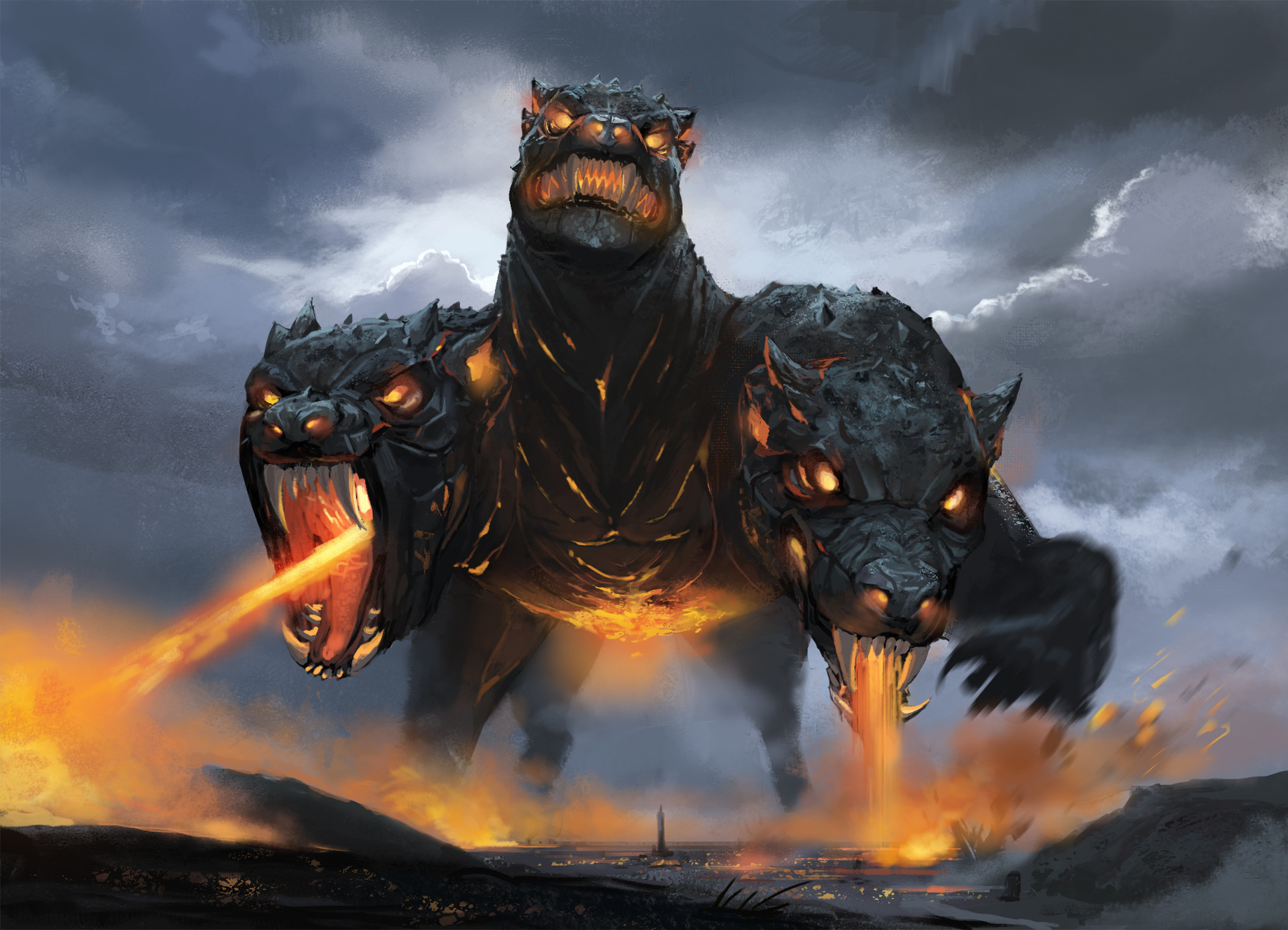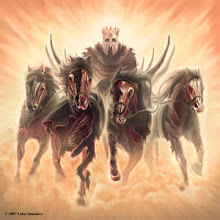

"As a twelfth labour Herakles was to fetch Kerberos (Cerberus) from Haides' realm. After showing Kerberos to Eurystheus, he took it back to Haides' realm." Then, with it in tow, he made his ascent through Troizenos (Troezen). He found Kerberos at the gates of Akheron (Acheron), and there, pressed inside his armour and totally covered by the lion's skin, he threw his arms round its head and hung on, despite bites from the serpent-tail, until he convinced the beast with his choke-hold. "Herakles asked Pouton (Pluton) for Kerberos (Cerberus), and was told to take the hound if he could overpower it without using any of the weapons he had brought with him. Aldrich) (Greek mythographer C2nd A.D.) : Pseudo-Apollodorus, Bibliotheca 2, 125 (trans. " ‘O, you most shameless desperate ruffian, you O, villain, villain, arrant vilest villain! Who seized our Kerberos (Cerberus) by the throat, and fled, and ran, and rushed, and bolted, haling of the dog, my charge!’" " Let us beware lest the cursed Kerberos (Cerberus) prevent us even from the nethermost hell from delivering the goddess by his furious howling, just as he did when on earth." O'Neill) (Greek comedy C5th to 4th B.C.) : There he perceived the spirits of wretched mortals by the waters of Kokytos (Cocytus), like the leaves buffeted by the wind over the bright sheep-grazed headlands of Ida."Īristophanes, Peace 315 ff (trans. "Once, they say, the gate-wrecking, unconquerable son of thunder-flashing Zeus went down to the house of slender-ankled Persephone to fetch up to the light from Hades the jagged-toothed dog, son of unapproachable Ekhidna (Echidna). Greek Lyric IV) (Greek lyric C5th B.C.) : "And before them a dreaded hound ( deinos kunos), on watch, who has no pity, but a vile stratagem : as people go in he fawns on all, with actions of his tail and both ears, but he will not let them go back out, but lies in wait for them and eats them up, when he catches any going back through the gates."īacchylides, Fragment 5 (trans. And next again she bore the unspeakable, unmanageable Kerberos (Cerberus), the savage, the bronze-barking dog of Haides, fifty-headed, and powerful, and without pity."

Evelyn-White) (Greek epic C8th or C7th B.C.) : But I brought the hound out of Haides' house and up to earth, because Hermes helped me on my way, and gleaming-eyed Athene.’" " ‘He once sent me even here to fetch away the hound of Haides, for he thought no task could be more fearsome for me than that. "If in the wiliness of my heart I had had thoughts like his, when Herakles (Heracles) was sent down to Haides of the Gates, to hale back from Erebos (the Dark) the hound of the grisly death god ( Haides Stygeros), never would he have got clear of the steep-dripping water Styx." Source: Dictionary of Greek and Roman Biography and Mythology.ĬLASSICAL LITERATURE QUOTES Heracles, Cerberus and Hecate, Apulian red-figure volute krater C4th B.C., Staatliche Antikensammlungen 784.) The place where Cerberus kept watch was according to some at the mouth of the Acheron, and according to others at the gates of Hades, into which he admitted the shades, but never let them out again. 449.) Some poets again call him many-headed or hundred-headed. Later writers describe him as a monster with only three heads, with the tail of a serpent and a mane consisting of the heads of various snakes. 311) fifty-headed and a son of Typhaon and Echidna. 623.) Hesiod, who is the first that gives his name and origin, calls him ( Theog. EKHIDNA (Bacchylides Frag 5, Ovid Metamorphoses 7.412)ĬE′RBERUS (Kerberos), the many-headed dog that guarded the entrance of Hades, is mentioned as early as the Homeric poems, but simply as "the dog," and without the name of Cerberus.

TYPHOEUS & EKHIDNA (Hesiod Theogony 310, Quintus Smyrnaeus 6.260, Hyginus Pref & Fab 30) Kerberos' name perhaps means "Death-Daemon of the Dark" from the ancient Greek words kêr and erebos. Herakles (Heracles) was sent to fetch Kerberos as one of his twelve labours, a task which he accomplished with the aid of the goddess Persephone. According to some he had fifty heads although this count may have included the serpents of his mane. Kerberos was depicted as a three-headed dog with a serpent's tail, mane of snakes, and a lion's claws.

KERBEROS (Cerberus) was the gigantic, three-headed hound of Haides which guarded the gates of the underworld and prevented the escape of the shades of the dead. Death-Darkness? Heracles and Cerberus the hound of Hades, Caeretan black-figure hydria C6th B.C., Musée du Louvre


 0 kommentar(er)
0 kommentar(er)
